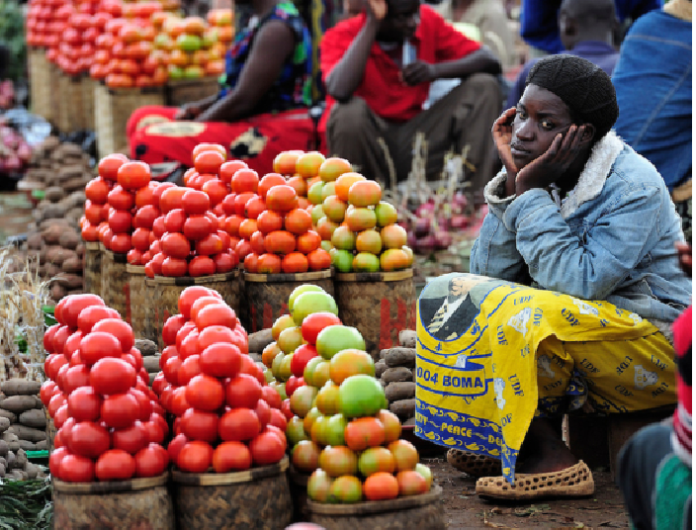* Over 33 million at risk
* Resurgence of insecurity poses serious threat
* More than 50% of Nigerans living below poverty line – World Bank
Despite the biting economic hardship, Nigerians have been warned to hear up for an imminent food shortage which will be compounded by the resurgence of insecurity across states, DAVID MAXWELL writes.
With over 50% of Nigerians living below the poverty line, it goes without saying that the economic situation in the country is quite dire.
According to the World Bank, “Since 2018, the share of Nigerians living below the national poverty line is estimated to have risen sharply from 40.1 percent to 56.0 percent.”
The Cadre Harmonisé Report for October has forecast that at least 33.1 million people across 26 states and the Federal Capital Territory, FCT, will face a food and nutrition crisis between June and August 2025.
This forecast is based on the CH Analysis Report, which was released on Friday in Abuja.
The analysis was carried out by the United Nations Food and Agriculture Organization, the World Food Programme, the Federal Ministry of Agriculture and Food Security, along with other partners.
The states affected include Sokoto, Zamfara, Borno, Adamawa, Yobe, Gombe, Taraba, Katsina, Jigawa, Kano, Bauchi, Plateau, Kaduna, Kebbi, Niger, and Benue.
Additional states impacted are Cross River, Enugu, Edo, Abia, Kogi, Nasarawa, Kwara, Ogun, Lagos, Rivers, and the FCT.
According to the report, the projected figure includes 514,474 Internally Displaced Persons in Borno, Sokoto, and Zamfara.
It also revealed that around 25 million people across the 26 states and the FCT are currently experiencing food crises.
Would you like this further condensed or adapted for a particular audience?
FAO Country Representative to Nigeria and ECOWAS, Kouacou Koffy, called for urgent attention and a unified approach to address food and nutrition security in the country.
He stated, “With the concerted efforts of the government, CH stakeholders, and the international community, we can move closer to alleviating hunger and reducing suffering for Nigeria’s most vulnerable populations.
“We are facing unprecedented challenges affecting livelihoods and food and nutrition security globally, regionally, and nationally.”
Koffy said that Nigeria is experiencing a combination of shocks, including economic factors affecting the prices of staple crops and agricultural
commodities, climate-related events such as floods and droughts, and insecurity.
He explained that the goal of CH workshops is to analyse available food security data and contributing factors to identify populations and areas at risk of food and nutrition insecurity in the country.
According to him, these workshops also aim to propose appropriate measures to prevent or mitigate ongoing food crises.
He stated, “CH analysis is the most reliable and widely accepted early warning tool for humanitarian programming, food security, and livelihood response targeting, as well as for prioritising development programmes.
Key drivers of this impending crisis include insecurity, insurgency, kidnapping, and banditry, which have severely impacted households’ livelihoods and their ability to cope with shocks. Soaring food prices, reduced availability, and limited access to clean water exacerbate the situation.
*We have faced unprecedented times in the country and region, with multiple shocks affecting livelihoods and food security,” said Kouacou Dominique Koffy, FAO’s country representative, emphasizing the urgent need for action.
Recently there has been reported cases of the resurgence of senseless killings resulting in massacre and bloodletting in the North Central states of Benue and Plateau – two states known for their agrarian culture, with Benue State known as the food basket of the nation.
According to Amnesty International,
“In Plateau State, from December 2023 to February 2024, at least 1,336 people were killed. Of those killed, 533 were women, 263 were children, and 540 were men. Over 29,554 people were displaced, out of which 13,093 were children while 16,461 were women. Also, in mid January, at least 40 farmers were killed in an attack by suspected Islamist militants.
In Benue State, on April 10, two farmers were murdered by the marauders in Gwer West LGA.
Same day, three persons were killed at Mbasombo community also in Gwer East LGA, while the latest attack on Otobi Akpa in Otukpo LGA and the boundary with Nasarawa State claimed the lives of at least 13 persons, with several others declared missing.
Speaking to our reporter, Mr Husseini Dodo, a farmer based in Borgu in Niger State, said: “If you look closely, all these commities constantly being attacked in Niger, Plateau, Benue, Borno, Edo, Ebonyi, Enugu States etc, are all farming communities. So I think it is a deliberate move to starve the nation. What they intend to gain from this is best known to them, but I expect our military and other security agencies to resort to intelligence gathering so as to know why, and to nip it in the budget.”





